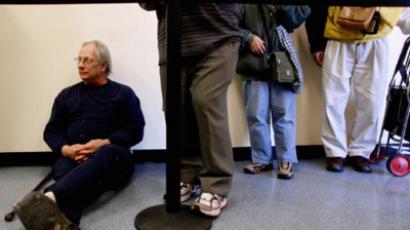Paycheck-to-paycheck: US households barely getting by

More than one-third of American households are barely able to manage their bills, getting by financially only paycheck-to-paycheck, a new study reveals.
Research out of the Consumer Federation of America and the Consumer Planner Board of Standards, Inc. suggests that Americans are less well off now than during the Clinton administration, with 38 percent of households questioned — nearly two-fifths — saying they are only barely able to get by. According to their survey of 1,508 US households, not only do a substantial sample of those polled say they live paycheck-to-paycheck, but nearly one-third, 30 percent, say they are actually financially comfortable. Additionally, only 34 percent say that they feel like they will be able to retire by age 65. The results of the responses out of the later study offer a sharp contrast to the findings of a previous analysis published in 1997. When the CFA participated in a similar poll 15 years earlier, only 31 percent said they lived paycheck to paycheck, showing an increase of seven percentage points in just a decade and a half. The federation adds that the percentage of respondents who indicated they felt comfortable financially has fallen significantly as well.“Consumers understandably are more nervous about investing their money given recent revelations about financial fraud, manipulation and abuse of clients,” Kevin R. Keller, CEO of CFP Board, explains in a press release accompanying the study. “This doesn’t mean that people shouldn’t create a financial plan and be prepared. We encourage consumers to do their homework and find a financial professional who always puts the clients’ best interests first and abides by a fiduciary standard of care.”CFA Executive Director Stephen Brobeck adds in the report that maintaining a personal finance plan, regardless of ones’ income, is essential for achieving and maintaining goals in post-recession America. With the national economy continuously experiencing punctuated periods of mass unemployment, stagnant wages and Wall Street corruption, though, coordinating and implementing savings plans is becoming increasingly more difficult for Americans to carry out. According to a report published in December that pulls from 2010 US Census data, almost half of Americans — around 146 million — have incomes that place them either at or below the poverty line. A separate study earlier in 2011 suggested that in the nation’s capital of Washington, D.C., around earns less than half of what would put them at the poverty line.In a report published by the Associated Press earlier this month, demographers questioned say that they predict rampant poverty to continue until at least 2014 “due to expiring unemployment benefits, a jobless rate persistently above 6 pe cent and weak wage growth.”














